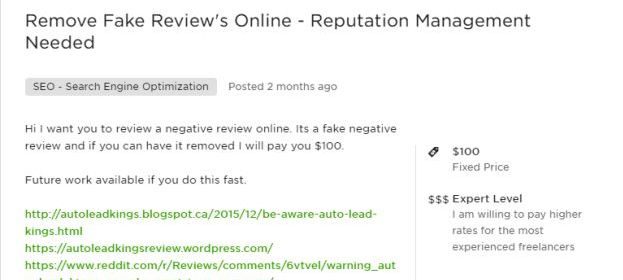On job sites like Fiverr and Upwork, you’ll find many job listings for writing fake reviews.
Interestingly, on the same platforms, you’ll also find many job listings for removing fake reviews, like the following one:
From personal experience and anecdotal evidence, many online reviews are fake.
Regular readers of this blog know that I don’t go too much by research.
But, in this case, there happens to be research that resonates strongly with personal experience and anecdotal evidence: According to a study conducted by LocalCircles, 50% of reviews on online portals are fake.
But reviews are still so popular. (Should you need any proof of that, you’ll find it in my blog post titled Why Are Reviews So Powerful In Social Media Customer Service?)
How come?
Despite serious doubts cast on the veracity of reviews, why do shoppers trust reviews so much?
In this blog post, I’ll attempt to answer this question.
I conducted a quick-and-dirty survey of Gen Y and Gen Z people about their views on reviews. (I selected this cohort because they’re known to make heavy use of reviews.)
This is what they told me:
- They don’t bother with reviews while shopping at brick-and-mortar stores (yes, they do a lot of that)
- They do check out reviews while shopping online
- They suspect that there are a lot of fake reviews online. Their antennae go up whenever they read a review that’s full of typos and grammatical mistakes
- But they still trust reviews because they presume that fake review is a common thing with all brands / items.
Now for some analysis, insights and wisdom:
- Reviews are used mainly for comparison between two or more brands. All brands are equally likely to be afflicted by the fake reviews problem. The “fakeness” tends to get cancelled out in the comparison. So fake reviews is not such a big problem
- People assessing attributes of a certain brand in isolation – not in comparison with another brand – might not exhibit the same blasé attitude about fake reviews. But they form a relatively small cohort of non-shoppers like journalists and researchers
 Baby Boomers and Gen Xers generally traverse the AWARENESS, INTEREST and DECISION stages of the AIDA funnel and place the order at the ACTION stage. However, I’ve observed that many Millennials place the order at the INTEREST / DECISION stage itself. Let’s take apparels. Anecdotally, younger people are comfortable buying clothes online whereas older people are not. The stock reason given to explain this behavior is, younger people are “more tech-savvy”. I don’t buy this. Regardless of age or generation, it’s equally painful to select the right fit, size, and color of a dress and otherwise navigate an app adequately to reach the ACTION stage. Older people don’t reach this stage, ergo don’t order clothes online. On the other hand, younger people tap the BUY button at the I or D stage itself without having made up their mind to buy the items. Once they get the clothes, they try them out and keep what they like and return what they don’t. In other words, they reach the ACTION stage only after receiving the goods. Therefore, the stakes of fake reviews at the point of order placement on the app are low.
Baby Boomers and Gen Xers generally traverse the AWARENESS, INTEREST and DECISION stages of the AIDA funnel and place the order at the ACTION stage. However, I’ve observed that many Millennials place the order at the INTEREST / DECISION stage itself. Let’s take apparels. Anecdotally, younger people are comfortable buying clothes online whereas older people are not. The stock reason given to explain this behavior is, younger people are “more tech-savvy”. I don’t buy this. Regardless of age or generation, it’s equally painful to select the right fit, size, and color of a dress and otherwise navigate an app adequately to reach the ACTION stage. Older people don’t reach this stage, ergo don’t order clothes online. On the other hand, younger people tap the BUY button at the I or D stage itself without having made up their mind to buy the items. Once they get the clothes, they try them out and keep what they like and return what they don’t. In other words, they reach the ACTION stage only after receiving the goods. Therefore, the stakes of fake reviews at the point of order placement on the app are low.
This is why I believe online shoppers use reviews even if half of them are fake.
Wanamaker said half his advertising was wasted. 100 years later, advertising is still alive and kicking.
“Half my advertising works; I don’t care which half.”
– "Ketharaman’s Wanamaker Rebuttal"https://t.co/ercGq1dYfD— GTM360 (@GTM360) April 17, 2018
So will reviews 100 years from now, despite aspersions being cast about 50% of them today.
